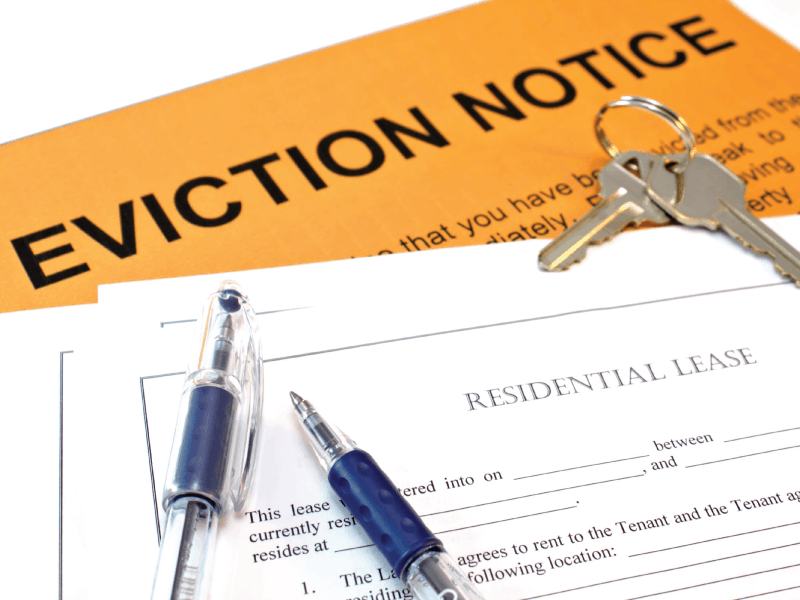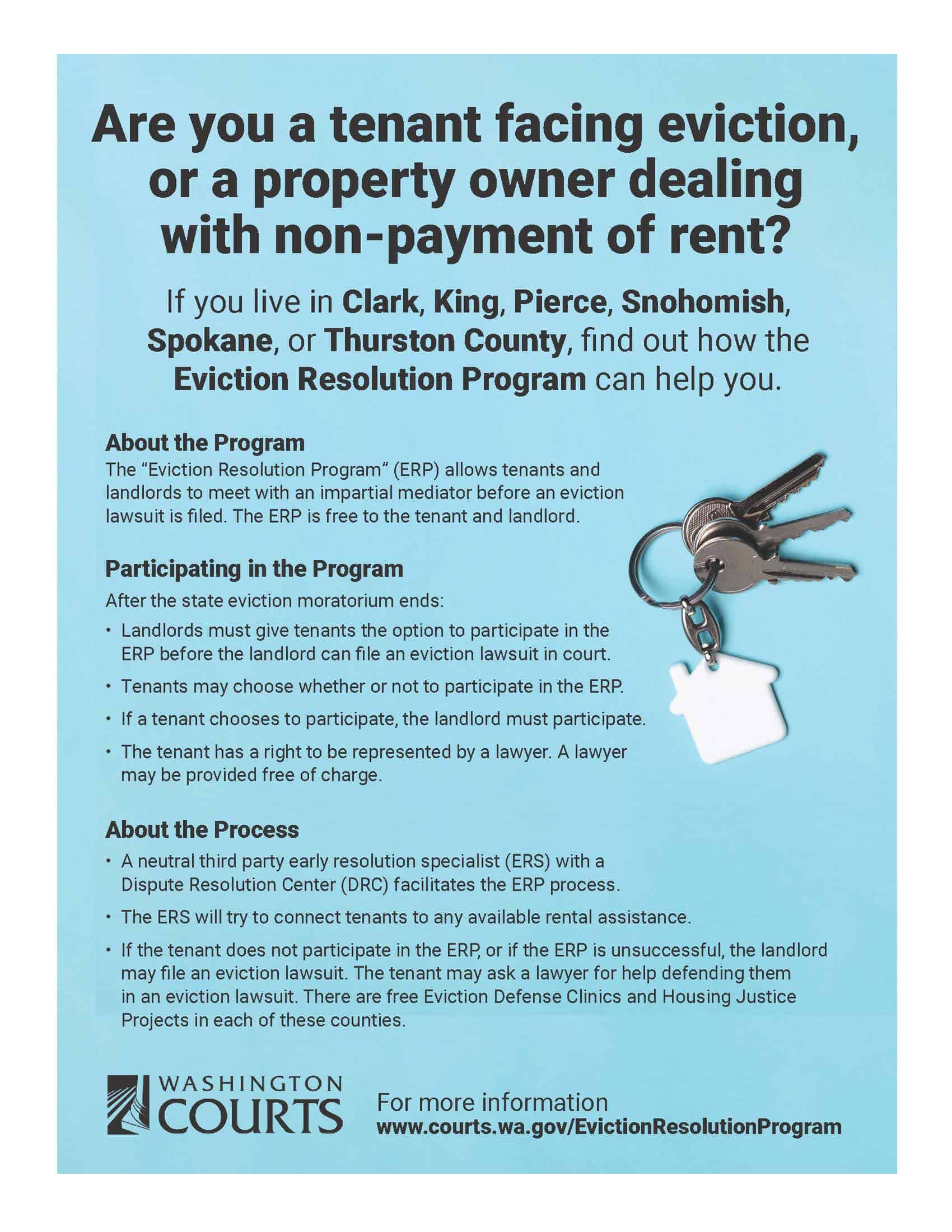The ERP Helps Tenants and Landlords Avoid Eviction Proceedings during COVID-19
 Since February 2020, nearly one million people in Washington state lost their jobs or have had employment hours severely curtailed because of the COVID-19 emergency. This mass loss of income, coupled with substantial barriers in accessing state and pandemic unemployment insurance, has made it impossible for many families and individuals (tenants) to keep current in rental payments.
Since February 2020, nearly one million people in Washington state lost their jobs or have had employment hours severely curtailed because of the COVID-19 emergency. This mass loss of income, coupled with substantial barriers in accessing state and pandemic unemployment insurance, has made it impossible for many families and individuals (tenants) to keep current in rental payments.
In response to the COVID-19 emergency and the anticipated deluge of eviction filings, the Washington Supreme Court issued an Order in September of 2020 authorizing the creation of a program to support Landlords and Tenants in resolving cases before they are filed in court. This program, called the Eviction Resolution Program (ERP), is in effect in King County, Pierce County, Snohomish County, Spokane County, Thurston County, and Clark County Superior Courts.
The goal of the Eviction Resolution Program is to:
- Bring all parties to the table with the assistance of qualified and trained Eviction Resolution Specialists.
- Explore the amount of back rent owed, the current and prospective circumstances of the tenant, the availability of rent, and other assistance to resolve the deficit.
- Discover a range of other terms that might resolve the matter in a way that allows the tenant to retain housing (and avoid the need for filing an unlawful detainer action).
Tenants and landlords meet with resolution specialists provided by the participating Dispute Resolution Centers who can mediate efforts to create repayment plans, resolve disputes, and connect with rental-assistance programs.
Dispute resolution centers (DRCs) are nonprofit public service organizations and were established by the Washington State Legislature in 1984 to provide avenues for the successful and informal resolution of disputes. (RCW 7.75)
The Eviction Resolution Program is a “voluntary” program until March 31, 2021. After the eviction moratoria are lifted, however, all Landlords in the above counties are required to participate before they can file rent-related evictions. If a renter chooses not to participate in the program, landlords can proceed with rent-related evictions.
Landlords can voluntarily service ERP Notices upon defaulting tenants prior to the Eviction Moratorium expiration date, to kick start mediations and negotiations. Following the ERP process prior to the expiration of any state and/or local eviction moratoria is encouraged and has practical benefits.
Any Landlord that voluntarily follows the Eviction Resolution Program process prior to the expiration of the moratoria will be deemed to have followed the requirements and need not do so again once the moratoria expire.
What is the Eviction Resolution Program Process?
Step 1: ERP Notice #1 is Served
To begin the Eviction Resolution Program process, landlords must serve the tenant with "ERP Notice #1", with tenant resources included on the bottom of notice.
Step 2: 14-Day Tenant Response Period
Once ERP Notice #1 is served, the tenant has 14 days to respond to the landlord or landlord's lawyers, and only then can the landlord engage the DRC – Dispute Resolution Center. The DRC has hired specialists to assist with the resolution of non-payment disputes – “ERS” Eviction Resolution Specialists.
What if the tenant never responds to ERP Notice #1?
If the tenant fails to respond or communicate with the landlord or the DRC after 14 days from serving ERP Notice #1, landlords are then required to serve ERP Notice #2 with tenant resources included at bottom of notice. The tenant then has 10 days additional days to respond. When serving Notice #2, landlords are required to provide a copy to the DRC. The DRC will attempt to reach out 3 times during the 10 calendar days after service of Notice #2.
What if the tenant doesnt' respond to ERP Notice #2?
If the tenant still does not respond after being served ERP Notice #2, the landlord may be eligible to file an Unlawful Detainer before the eviction moratorium expires.
Step 3: The DRC Engages
By responding to ERP Notice #1, the tenant is voluntarily agreeing to engage in the Eviction Resolution Program. This engages the DRC, who will undertake the Resolution Facilitation with the landlord and tenant. This may involve the Housing Justice Project, which may connect with the tenant and provide info related to rental assistance or funding.
The Eviction Resolution Program does not provide any rental assistance - only resources.
Step 4: Meet and Confer
The DRC will attempt to schedule a Meet & Confer between the Tenant and Landlord. The goal of this session is to come to an agreement on a repayment plan.
If a Resolution is reached between Tenant and Landlord...
If the case can be resolved and an agreement reached, no further action is required. However, after resolution, if the tenant has a payment plan in place and defaults, landlords will be eligible to receive a certificate from the DRC to be able to file an Unlawful Detainer.
If a Resolution is NOT reached...
If no resolution is reached and the tenant did not have representation at their first Meet & Confer session, then a second Meet & Confer session will be scheduled where the tenant will be provided the required legal representation.
Step 5: Mediation
If the case still cannot be resolved after the Meet and Confer, mediation will be offered.
During the voluntary period, if tenant fails to respond, comply, or reach an agreement during mediation, the process comes to a halt. Landlords are recommended to serve ERP Notice #1 again to see if they can restart the process with the hopes that the tenant will be responsive.
A Few Key FAQs About the Eviction Resolution Program
The Eviction Resolution Program was developed by a work group established by the Superior Court Judges’ Association (SCJA). The work group included representatives of landlord and rental housing associations, tenants, legal aid eviction defense attorneys, public housing authorities, dispute resolution centers, court clerks, the Administrative Office of the Courts, the Office of Civil Legal Aid, and superior court judicial officers.
Emergency funding has been requested so that DRCs can hire and train Eviction Resolution Specialists. On approval, the programs will move forward as quickly as possible. The goal is to have the basic infrastructure in place in each pilot county by November 1.
Any tenant who is affected by the COVID-19 emergency, is behind in rent and faces the prospect of eviction when the moratoria are lifted, and any landlord whose tenant is behind in rent and wishes to access the ERP conciliation process.
There is no income requirement. The program is open to tenants who may be undocumented.
No, there are no charges for ERP conciliation or mediation services.
There is no uniform answer to this question. It depends on the nature of the lease agreement. If all roommates are jointly liable for the rent, then it would be best to have all participate. Each case, though, will be different, and it is best to work with the Eviction Resolution Specialist to determine what approach is appropriate for the situation.
WANT MORE INFORMATION?
Contact our Property Management Specialist for answers about landlord-tenant relations after the pandemic. We can also provide you with a free Rental Analysis!






